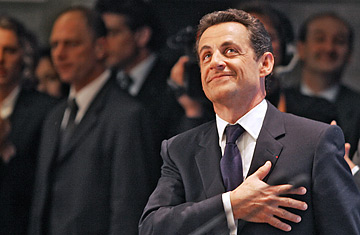
French right-wing presidential candidate Nicolas Sarkozy is applauded by supporters, May 6, 2007 after an unofficial announcement of the results of the French presidential election.
French conservatives completed their electoral sweep of power Sunday night with a a decisive victory in second round legislative polling but fell significantly short of the "tsunami" that had been expected to lift President Nicolas Sarkozy and his Union for a Popular Majority (UMP) a to a record majority in parliament. The Socialist Party (PS) blunted Sarkozy's expected tidal wave victory with a better than expected showing. Still, with conservatives dominating the presidency, legislature and government — and given Sarkozy's promise to swiftly push through sweeping reform — there's little doubt French society will soon will be prodded to a depth and degree of change it's never seen before. The question now is whether the Socialists can demonstrate enough opposition in parliament to mobilize France's notoriously militant street protesters to derail Sarkozy's reform efforts, as they have done to countless other reformers in the past.
Sunday's run-off election confirmed the general thrust of the first round of voting — albeit without the landslide expected by the UMP. Riding the wake of Sarkozy's popularity, UMP and allied conservative candidates retained their domination of parliament, winning 344 seats of the legislatures 577 total. But that victory also saw the UMP lose 46 of its outgoing seats to the Socialists, who surprisingly boosted their ranks from 148 to 186 seats. Though other leftist parties like the Greens and Communists wilted to around a collective 23, the overall result handed the opposition 227 seats. Sarkozy's Prime Minister Francois Fillon sought to put the Socialists' good showing in perspective. "The choice of voters has been clear and coherent in supporting the President and his application of reforms. Success of one side isn't defeat of the other, and we are obliged to take into account the wishes of voters who didn't back the President. [But] we won't wait any longer on the reforms the French want, and we will reform and innovate."
Nevertheless, election night held an unpleasant surprise for Sarkozy: the stunning defeat of conservative heavyweight Alain Juppe, who as Environment, Transport, and Sustainable Energy Minister was number two in Sarkozy's pre-election government. Juppe's failure to win a legislative seat leaves his political future in grave doubt.
Meanwhile, in spite of the relative good news on Sunday, the Socialist implosion became personal. The party's presidential candidate, Sgolne Royal announced her separation from her long-time life partner, PS leader Franois Hollande. Their relationship had reportedly been rocky in Royal's loss to Sarkozy — members of her campaign team placed much of the blame for her defeat on Hollande. Royal said she would seek to win leadership of the party from the father of her children.
Many observers believe Sarkozy's first reform will be to keep his promise to "restore the value of work" — which will probably mean encouraging people, perhaps by way of legal subsidies, to work beyond France's controversial legal limit of 35 hours per week. He's also likely to propose a series of credits or tax reductions to allow people to hold on to earnings. He is also likely to find savings in social services to cut France's spiraling public debt. Another area where Sarkozy is expected to act quickly — perhaps in July — is with a series of measures that stiffen punishment for criminals and youth offenders in particular, while elsewhere tightening rules and requirements for immigrant applicants seeking to join the heads of families in France. Another issue Sarkozy has promised to tackle is the labor strikes that have entirely shut down public transport in the past.
"Sarkozy's election [in May] has made it clear that the majority of French voters not only want but expect reform and change," says political analyst Alain Duhamel. "They gave Jacques Chirac that same mandate and a parliamentary majority that was, back in 2002, considered massive, but he ended up putting reform on hold and backing away from the protests it caused. Sarkozy's main characteristic is action, and he'll move quick to distinguish himself from Chirac by delivering what he has promised."
But that does not mean he will not meet with resistance. The transportation issue, will doubtless provoke protests and strikes in the fairly near future. However, that's where his parliamentary majority will help see him through: whereas past protests have often forced governments to shelve announced reforms as waffling public opinion began sympathizing with strikers, Duhamel says the new electoral mandate will allow officials to pull together and ride out the storm. "There will be times of tension, and there may even be conflict and controversy, but Sarkozy has between a year and two years to really get things done without the risk of people souring on him," Duhamel notes. "France has not so much evolved to the right, but returned to its traditional position as a bit to the right, as a liberal, Bonapartist society seeking modernity under a strong leader who will protect it from the risks of modernity."
Duhamel does not believe the stronger than expected showing by the Socialists in this second round of voting diminishes Sarkozy's mandate. "The good news for the Socialists is they're really the only party on the left still standing anymore, and could by default become the party all leftist band around to mount a counter-offensive," Duhamel says. "The bad news is the Socialists have refused to regroup, reform, and put internal rivalries past them for years now, and only have two years ahead of the next [national] election to pull that off." That electoral test will be for the European Parliament. Says Duhamel, "In the meantime, Sarkozy will have the public largely behind him."
